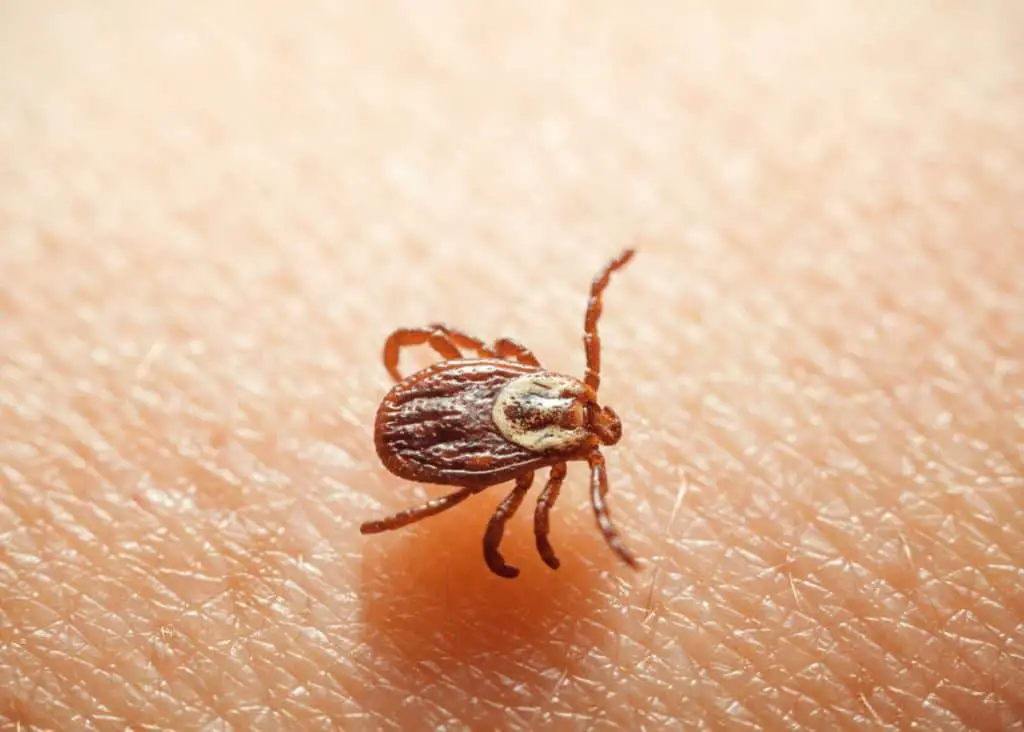
With warm weather comes ticks. These bloodsucking pests are an irritation, but they have the potential to be dangerous; Lyme disease and Rocky Mountain spotted fever are serious medical conditions, sometimes even fatal conditions, that are caused by tick bites. So, are there natural predators to this irritating bug?
Ticks have many natural predators. Insects such as chiggers, wolf spiders, fire ants, and beetles eat ticks. Some birds prey on ticks: chickens, quail, and ducks. Reptiles and amphibians are predators to ticks, and even mammals such as squirrels, chipmunks, and mice are naturals enemies to ticks.
Unfortunately, most of these predators don’t feed on ticks exclusively. They’ll eat ticks if they find them, but won’t actively hunt them. This doesn’t functionally decrease the tick population.
What Bugs Eat Ticks?
Fortunately, there are a few different ways you can get rid of ticks. There are plenty of animals that feed on ticks; there are even plants that will repel ticks and the animals that carry them. So, let’s first talk about the insects that are predators to ticks.
Insects are always in abundance; luckily, there’s plenty of bugs that will eat ticks. Chiggers—not to be confused with jiggers, which are a type of lice—are scientifically known as trombiculid mites, and are actually related to ticks. However, adult chiggers feed on other insects and their eggs; they will eat any ticks they come across, as well as mosquitos and other pests.
However, chiggers are pests themselves. Mite larvae eat living tissue to survive—they will attach to an animal or human host, much like a tick. Their feeding will cause intense skin irritation, sometimes welts, with severe itching, as well as allergy and immune responses. The larvae will fall off after a few days, and the welts and irritation will heal on their own within one to two weeks.
So, while chiggers will help with a tick infestation, they’ll most likely cause more problems.
If you are brave, you can choose to keep spiders around your home and yard. Spiders aren’t picky eaters—they’ll take whatever falls into their webs. But, when it comes to tick removal, wolf spiders are the most efficient.
Wolf spiders can be “partially beneficial”—they don’t weave webs, which means less cleanup, and they actively hunt pests such as ticks, fleas, and cockroaches.
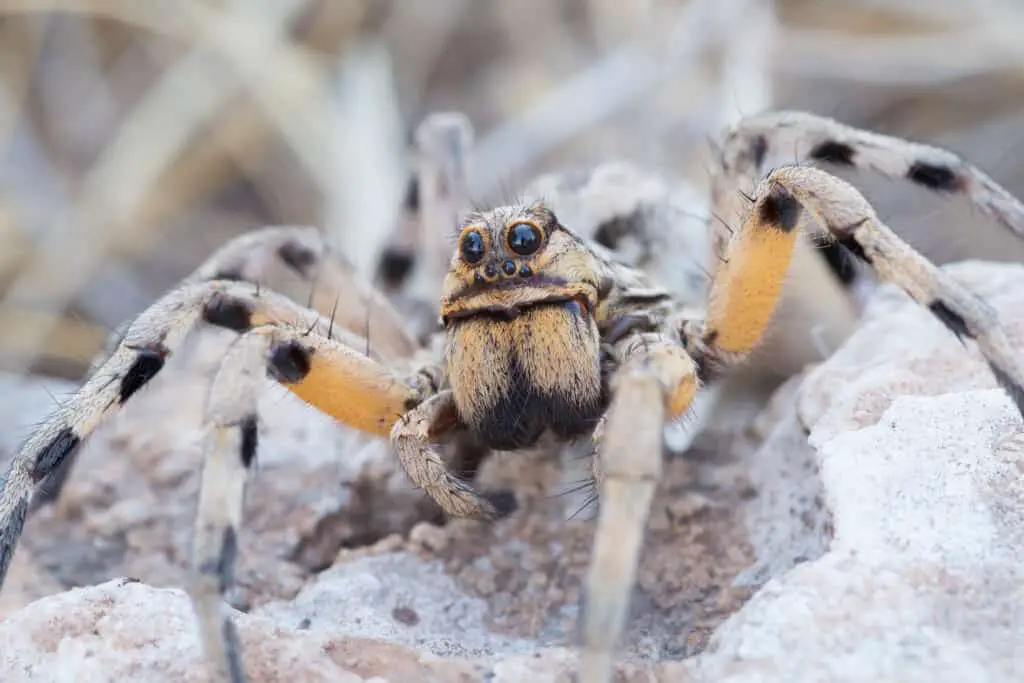
However, there is a good reason most people choose not to keep wolf spiders around, besides arachnophobia. First off, wolf spiders bite when threatened. They don’t have venom, fortunately; the bites are usually mild, but their bites hurt the same as a bee’s sting and will turn into an inflamed, itchy welt. They can also get into your home and cause further problems by spreading bacteria and posing a threat to children and pets.
The most common type of tick predators are beetles, specifically the Carabidae family, or ground beetles. These are the most common beetles, one of the largest insect families, and found almost everywhere in the world. However, beetles aren’t truly efficient tick hunters. They’ll eat whatever tick they find, but they won’t actively hunt them.
Ants will get rid of ticks as well. Fire ants, especially, are known to prey on ticks and boll weevils. However, fire ants will sting and bite if threatened and can escalate to an infestation of their own.
They can cause serious problems for other animals, such as songbirds or endangered species.
It’s debatable if ants would prey on ticks well enough to reduce their numbers effectively—they are generalists, meaning they’ll eat anything they find, but won’t specifically hunt for ticks.
What Birds Eat Ticks?
Most poultry are wonderful tick removal! Usually smaller birds, since they go for smaller prey, and flightless birds, who get their food from the ground are the ones that go for ticks the most often.
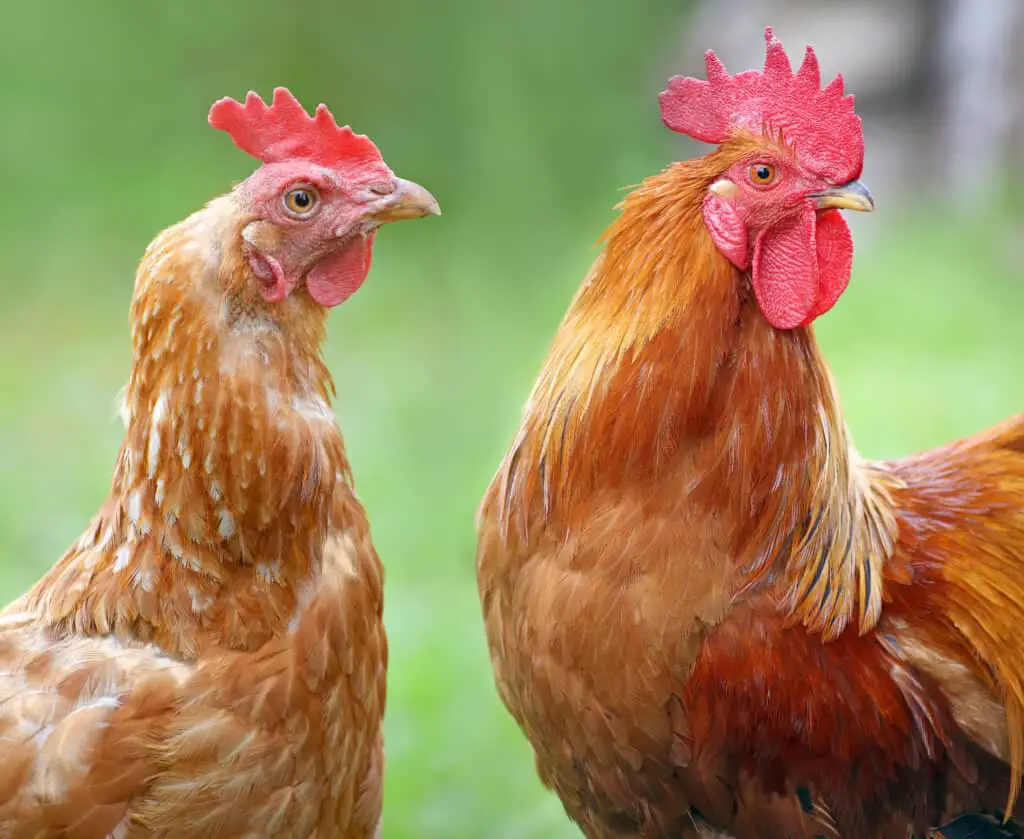
Common farm poultry, like chickens, quail, and ducks, can be allowed to wander your yard and garden, pecking away ticks and other pests. Chickens will even peck ticks off of other livestock.
Guinea hens, a bird native to Africa, have become wildly popular with American farmers for taking care of ticks. These birds will wander and gobble up any insect they find—tick, slug, beetle, and ant alike.
They’re also less destructive than chickens and ducks, causing less damage to your plant life while they feed. However, they also eat any insects that might be beneficial to your yard and garden, even insects that also prey on ticks.
Wild turkeys will also hunt ticks; the Department of Fish and Game has many projects to enhance habitats for wild birds as part of a push to control the increasing tick population.
Birds are top predators for ticks, but they’re generalists; they’ll eat ticks, but they’re not efficient for curbing the tick population.
What Reptiles and Amphibians Eat Ticks?
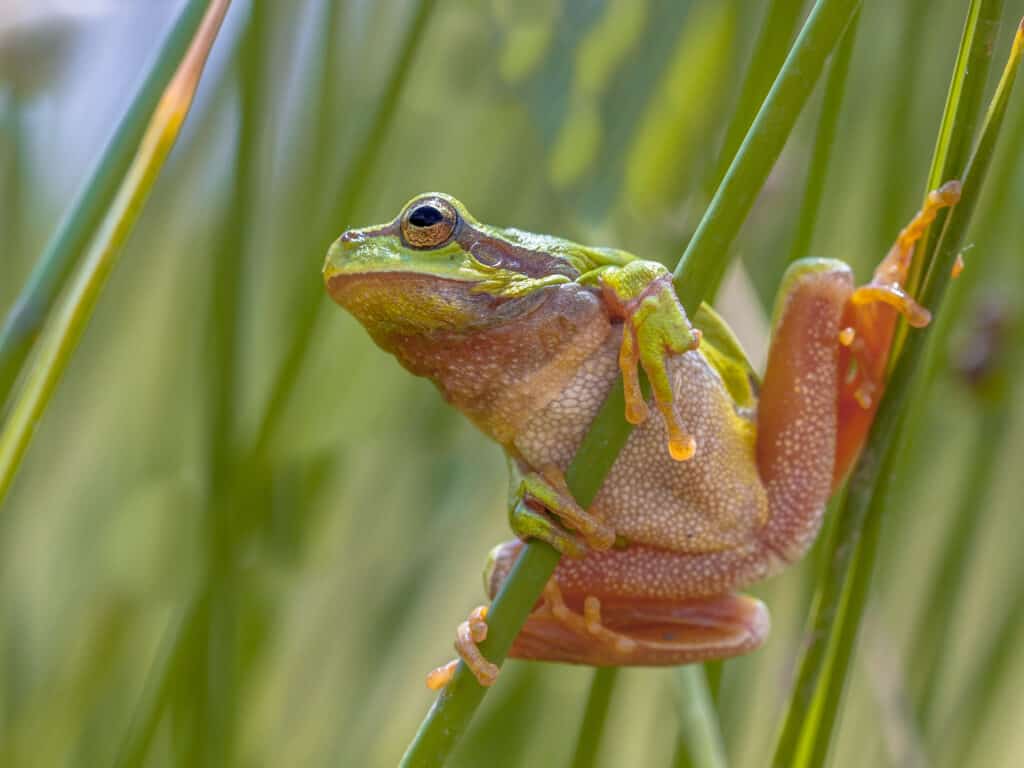
Frogs and toads are very good at finding and eating ticks—so are many species of common lizards. They’ll eat any ticks (and mosquitos!) within reach of their tongue.
Frogs tend to stay in or around the water, so they’ll only eat ticks if they’re near the water. Toads tend to venture a little further inland, so they’ll stand a better chance at tick removal.
What Mammals Eat Ticks?
Squirrels, chipmunks, mice, and small rodents eat most insects, including ticks. They’re much more effective at tick removal than bugs, birds, amphibians, or lizards.
This is because of something called an ecological trap. Ticks will latch onto these animals, and then the animals groom themselves and eat the ticks.
An ecological trap is a double-edged sword; the mammals will carry ticks wherever they go in your yard and garden, potentially spreading the infestation to a wider area.
The result of this means that these animals, while better than other predators on this list, aren’t great for home tick removal.
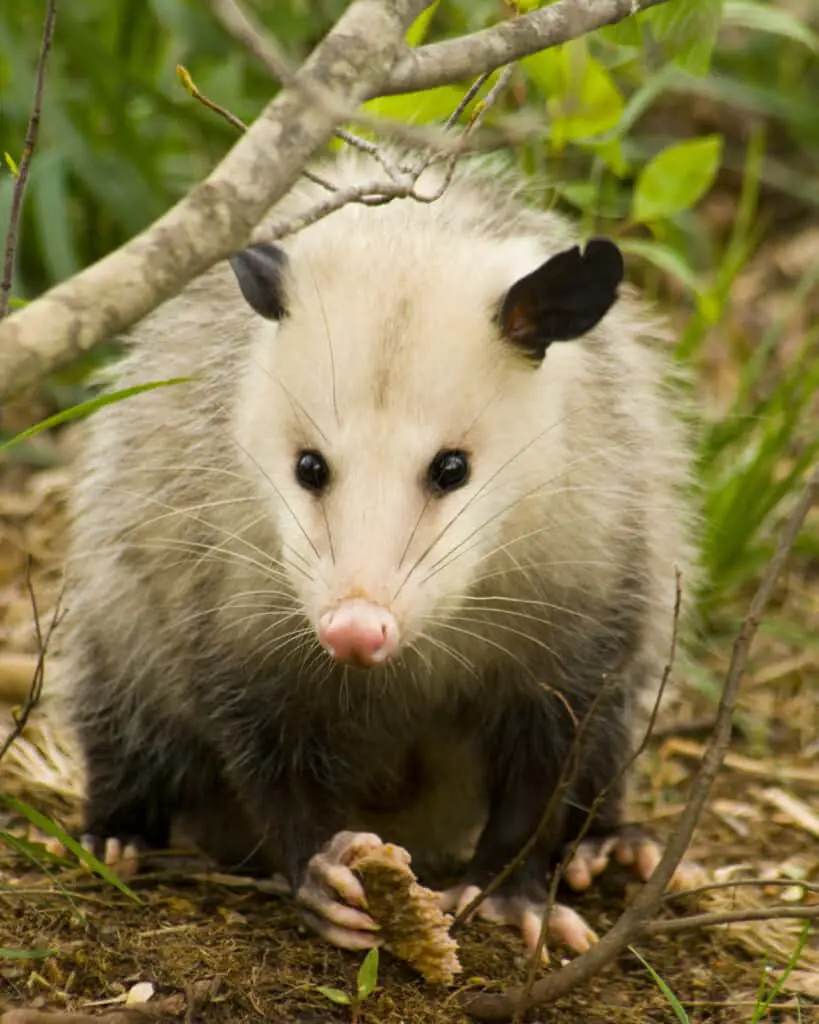
On the other hand, opossums are surprisingly efficient at tick removal. Opossums are tick’s most efficient natural predator, eating 95% of ticks they come across.
Possums carry ticks, but the difference is, they groom themselves thoroughly, eating any ticks they pick up in their ecological trap. It’s estimated that in one season, they can kill around 5,000 ticks!
Possums have a bad reputation as dirty and flea-and-tick-ridden, but, if we can find a way to increase the opossum population, there’s no telling how drastically the tick population will decrease.
What Plants are Effective Against Ticks?
Scientists and biological control experts are also working on projects to controls ticks; their most promising tick control they’ve found is actually not a predator at all.
It’s plants! Mainly, pathogenic bacteria and fungi that occur naturally in forest soil. Fungal sprays contain spores mixed with water; once sprayed, it’ll infect the tick and kill it within 3-5 days.
However, there is always the risk that these fungi will spread and grow in your yard and garden. With that growth, there is also a health concern.
To prevent a tick infestation, you can try planting bushes, trees, and shrubs that invite natural predators onto your property that aren’t appetizing to the animals ticks like to live on. Here are a few examples:
- Rosemary: This is a very common herb for cooking, easy to grow, and can survive in most conditions. It has an earthy smell and produces a lot of oils that have been shown to repel ticks. Also, deer—who carry ticks-—hate rosemary.
- Wormwood: This herb is a natural tick repellant. Tick hosts, like deer and mice, avoid this plant because of its bitter taste. Most species of wormwood grow easily in the wild, so there may already be some around your property.
- Garlic: This plant is very smelly, which makes it unappetizing to pests, both ticks and the animals that carry them.
- Lavender: This plant is known for beautiful purple flowers and a lovely scent. Like rosemary, this plant produces essential oils that repel ticks.
- Mint: In the same family as lavender and pennyroyal, this plant’s essential oils and strong scent repels any pests. This plant is easy to grow, but it can also grow invasively.
- Lemongrass: This grass smells like lemon, and is a great complement to lavender plants. This plant produces rich citronella oil, which repels and also has been shown to kill ticks.
- Geranium: These flowers make a great addition to any garden or flowerbed. They are highly toxic to animals that carry ticks; however, they are also toxic to cats and dogs.
- Marigold: These gorgeous yellow-orange flowers have a strong scent that repels ticks and mice. Deer will eat them if there’s nothing else around, but don’t prefer the taste.
- Rue: Rue extracts have been shown to be toxic to ticks. The oils are a strong disinfectant, and the leaves can be used as a flea treatment by rubbing them on the affected animal’s fur. But, be careful when handling this plant, as the same oils that keep pests away can cause blistering and rashes. Rue is ridiculously easy to grow; it grows in poor soil and doesn’t need much water.
- Chrysanthemum: These plants are known as the original pesticide. Some of the most common pesticides are made to mimic the chemical compounds naturally produced by chrysanthemums.
- They’re a great addition to any garden or flowerbed and are a hardy perennial plant. Their smell, while lovely to humans, usually drives away ticks and their carriers. Unfortunately, these flowers can be toxic to cats and dogs.
These plants have been scientifically proven to keep ticks away, but the research to prove this used high-concentration extracts or essential oils made from the plants, so the results can be drastically different when it comes to keeping the plants in your yard and garden.
However, while they may not be as effective as highly-concentrated oils and extracts, the plants themselves do a great deal for keeping ticks and their carriers away, and that certainly counts for something.
Are Natural Predators Effective?
Yes and no. Natural predators are a vital part of keeping the tick population under control. Natural predators are encouraged but aren’t a good strategy for completely removing ticks.
To make any noticeable impact on a tick infestation, you’d have to release many different predators into the environment; this is dangerous, unrealistic, and usually illegal.
We’ve learned, via disastrous experience, that releasing predators to deal with an infestation is a horrible solution, and often leads to ecological catastrophe. A famous example of this is the cane toad in Australia.
The cane toad is native to South America, but a few were brought to Australia to control a beetle that was destroying the sugar cane crop. Toads eat beetles, but the problem here was that the cane toad feeds at night, and the beetles were active during the day.
The toad population exploded, but the beetle population was unaffected. Instead, the Australian ecosystem was compromised; now, they have two problems—the beetle infestation, and the invasive cane toads. Ironic, isn’t it?
It’s best to leave biological control to the experts. Don’t go releasing opossums, toads, or anything else into your yard; you won’t know what the effect might be. Instead, try to keep any sources away from your yard and garden. The best offense against an infestation is defensive procedures.
Keep wild and stray animals out of your yard and garden. Although ticks feed on humans, mice and deer are vital to the tick life cycle and are their main means of getting around.
Mice and deer are the biggest source of ticks, by far, and will bring an infestation to your yard and garden. If you keep these animals away from your yard and garden, you’re much less likely to have ticks.
So, when you’re faced with a tick infestation, the best thing you can do is rely on human intervention. It’s best to hire a reputable, experienced exterminator. They’ll use the correct chemicals, in the right amount and should offer comprehensive pet guidance. Their training and experience will keep you, your home, yard, and garden safe.
Experienced pest control technicians know the behaviors and habits of ticks—they’ll know which areas to spray to have the greatest impact on any infestation. They’ll also know what to look out for, and will give you advice on how to prevent further spreading.
